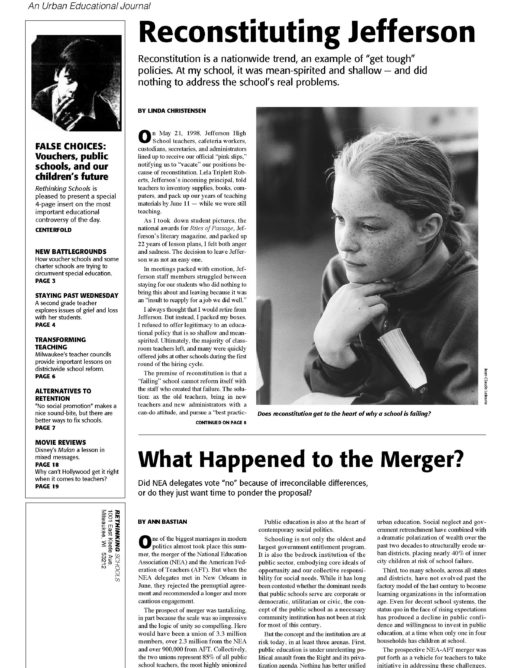Preview of Article:
New Battlegrounds
As charters and voucher schools decry the "burdens" of special education, advocates for students with disabilities prepare to defend hard-won rights
Three federal laws apply directly to the rights of students with disabilities. In 1975, Congress enacted what is now called the Individuals with Disabilities Act (IDEA) to end persistent abuses, such as public schools refusing to educate children with disabilities or giving them a third-rate education. IDEA requires that states and local education agencies provide a “free and appropriate public education” (FAPE) for all children with disabilities. FAPE consists of specially designed teaching and individualized support. To the maximum extent possible, FAPE must help students with disabilities stay in the regular classroom and learn what all the other children learn. Local education agencies are responsible for providing the comprehensive services and procedural protections in IDEA, and states must ensure compliance. Privately funded schools do not have to provide IDEA services.
Two other federal statutes prohibit discrimination in both public and private schools. Section 504 of the Rehabilitation Act of 1973 (Section 504) prohibits recipients of federal funds from discriminating against people with disabilities. All states, all public schools, and some private schools receive federal funds. Further, the Americans with Disabilities Act (ADA) prohibits disability discrimination in all services, programs, and activities provided or made available by state and local governments or their agencies, and in places of public accommodation. The ADA applies to states, public schools, and private schools which are not controlled by religious organizations. Discrimination includes exclusion and denial of comparable benefits and services, and violations of extensive regulations. In the context of education, disability rights advocates have not used Section 504, the ADA, and their implementing regulations nearly as fully as the IDEA, but their broad coverage offers vast opportunity for new advocacy efforts.
In summary ( before vouchers and charters enter the picture):
- All public schools must abide by IDEA, Section 504, and the ADA;
- Private non-religious schools that receive federal funds must abide by the ADA and Section 504

